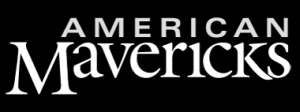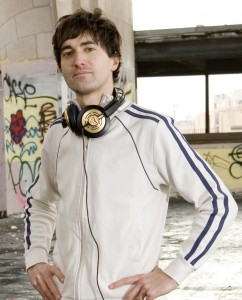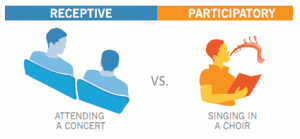With so many changes afoot in the American orchestral world, what do music directors see as particular challenges and opportunities? (more…)
Posts Tagged ‘san francisco symphony’
-
Video: Music Directors Discuss Challenges and Opportunities
Topic: Audience, Community, Creativity | Tags: alan gilbert, charles dutoit, cleveland orchestra, franz welser-möst, gustavo dudamel, la phil, mtt, ny phil, philadelphia orchestra, san francisco symphony, video, Yannick Nézet-Séguin
November 6, 2012 by Beth Hondl | Comments (0)
-
Video: Music Directors and The Orchestra
How exactly does a conductor work with an orchestra? We asked several music directors to speak about their philosophy and technique. (more…)
Topic: Creativity | Tags: alan gilbert, charles dutoit, cleveland orchestra, franz welser-möst, mtt, ny phil, san francisco symphony, video
November 6, 2012 by Beth Hondl | Comments (0)
-
Podcast: Chapter Ten – Looking Ahead, in Philadelphia and Beyond
When The Philadelphia Orchestra emerged from Chapter 11 bankruptcy in July 2012, the ensemble became a canary fluttering back out of a deep dark mine. Philadelphia’s path forward will be closely watched, and not only because music lovers at home and around the world have such a stake in this beloved institution. In both its difficulties and its stategies for confronting and transcending them, The Philadelphia Orchestra strikes a resonant chord with other American orchestras, large and small.
This podcast was developed from our June 2012 behind-the-scenes discussion.
Chapter Ten – Looking Ahead, in Philadelphia and Beyond
Play | Download | Transcript
Topic: Audience, Community, Creativity | Tags: Afa Sadykhly Dworkin, alan gilbert, allison vulgamore, cleveland orchestra, deborah rutter, gary hanson, gustavo dudamel, jeremy rothman, joseph conyers, mtt, philadelphia orchestra, podcast, san francisco symphony, stanford thompson, steven winn, Yannick Nézet-Séguin
September 18, 2012 by Beth Hondl | Comments (0)
-
Video: Michael Tilson Thomas – Music Director of the San Francisco Symphony – on Creativity
Michael Tilson Thomas, Music Director of the San Francisco Symphony, talks about the different meanings of Creativity in the orchestral world. This video draws together highlights from our March 2012 event.
Topic: Creativity | Tags: mtt, san francisco symphony, video
April 5, 2012 by Beth Hondl | Comments (0)
-
Video: Michael Tilson Thomas – Music Director of the San Francisco Symphony – on Audiences
In addition to being Music Director of the San Francisco Symphony, Michael Tilson Thomas leads the New World Symphony in Florida — a group whose mission it is to prepare highly-gifted young musicians for leadership roles in orchestras and ensembles around the world. At our live event in March, he discussed how his work there also involves exploring new ways to interact with the audience.Topic: Audience | Tags: mtt, new world symphony, san francisco symphony, video
April 3, 2012 by Beth Hondl | Comments (0)
-
Steven Winn: Contrasting and Conflicting Notions of Creativity
As the current American Mavericks festival at the San Francisco Symphony demonstrates, there’s no one approach to creativity in the orchestral world. And Steven Winn—arts journalist and co-moderator of our live event in San Francisco this Saturday, March 17—is perfectly happy to take on all the contrasting and conflicting notions of creativity on display.
 E/C/D-sharp/C-sharp. From that taut little four-note cell, Aaron Copland spun out the material, at once dense and spacious, imploded and expansive, of his 1930 Piano Variations. Cunningly orchestrated by the composer 27 years later, the Orchestral Variations got the San Francisco Symphony’s 2012 American Mavericks festival opener off to a bracing start on March 8 at Davies Symphony Hall. It also got me to thinking about the marvel of creativity, which can feed on so little to generate so much, like some tiny, tremendously efficient micro-organism.
E/C/D-sharp/C-sharp. From that taut little four-note cell, Aaron Copland spun out the material, at once dense and spacious, imploded and expansive, of his 1930 Piano Variations. Cunningly orchestrated by the composer 27 years later, the Orchestral Variations got the San Francisco Symphony’s 2012 American Mavericks festival opener off to a bracing start on March 8 at Davies Symphony Hall. It also got me to thinking about the marvel of creativity, which can feed on so little to generate so much, like some tiny, tremendously efficient micro-organism. An hour later, deep into Henry Brant’s 1994 orchestration of Charles Ives’ mighty 1920 Concord Sonata (A Concord Symphony), creativity had morphed into a giant daisy chain of inspiration and influence. (more…)
Topic: Creativity | Tags: american mavericks, san francisco symphony, steven winn
March 14, 2012 by Beth Hondl | Comments (0)
-
Speaker Spotlight: Mason Bates, a composer/DJ taking the orchestral world by storm
 As The Bay Citizen puts it, “For nearly a decade, composer Mason Bates has been hailed as one of the young saviors of classical music.”
As The Bay Citizen puts it, “For nearly a decade, composer Mason Bates has been hailed as one of the young saviors of classical music.”He works with two major American orchestras in a formal capacity–as Composer-in-Residence at the Chicago Symphony and as Project San Francisco composer at the San Francisco Symphony–and audiences love his modern take on the orchestral sound. After a recent San Francisco performance of his piece “Alternative Energy” one fan on Twitter was offering $50 for a bootleg recording of the (so far) unreleased piece.
So, what is it about Mason Bates’ approach that is taking the orchestral world by storm?
Edmund Campion, a composer and professor of music at the University of California, Berkeley, said Bates was a much-needed bridge between musical worlds. “The orchestra today is fighting with its identity as a historical elephant,” Campion said. “Mason provides a sense of renewal, a connection to social and cultural things in contemporary life.” Read the full article on The Bay Citizen.
Indeed, trained at Juilliard and schooled in the clubs of San Francisco, neither the “electronica” nor the “classical” in Bates’ music seems forced. He’s not a crossover artist, just an artist, using the tools at hand to create what Michael Tilson Thomas calls, those “beautiful notes.”
On Saturday, March 17, composer Mason Bates will take part in our Talking About Creativity event in San Francisco. Paired in conversation with composer John Adams, it will be interesting to hear both of their thoughts on “Creativity” in the American orchestral world.
Register now for our free, live event on Saturday, March 17 with Mason Bates. Attendees will receive a free copy of the book/CD set American Mavericks. Learn more.
Topic: Creativity | Tags: chicago symphony, mason bates, san francisco symphony
February 28, 2012 by Beth Hondl | Comments (0)
-
Getting in on the Act
One of the interesting topics that came up during the Q&A session at Sunday’s event was how arts organizations can engage communities through participatory experiences. Rather than sit and passively watch a concert, people seem to increasingly prefer doing the playing and singing themselves. Certainly the eye-popping success of the YouTube Symphony shows there’s an appetite for hands-on participation in the orchestral world. Does the role of the orchestra in its community need to change accordingly?
Topic: Community | Tags: baltimore symphony, chicago symphony, DIY, neil harris, pacific symphony, participation, san francisco symphony, wolfbrown
October 28, 2011 by Beth Hondl | Comments (1)
-
A Pioneering Educational Partnership: the University of Michigan and the San Francisco Symphony
Participating in all three American Orchestra Forum events will be a group of eleven graduate students from University of Michigan School of Music, Theatre & Dance. These students are enrolled in “Musicology 650: The Ensemble in America,” an upper-level doctoral research seminar organized by musicology professor Mark Clague, author of this post. The class examines the history of orchestras, choirs, bands (concert, rock, and marching), and chamber groups in the United States.
The fundamental hypothesis of “The Ensemble in America” is that the history of music in the United States is not just a story of talented individuals (composers or musicians), but of cultural organizations, such as the San Francisco Symphony—encompassing its audience, staff, donors, and civic leaders, as well as its musicians. Generally we think of “Art” as the product of individual genius, but making music really requires collective action and these collectives can also be creative. The San Francisco Symphony centennial only highlights this pervasive phenomenon. (more…)
Topic: Community | Tags: american orchestra summit, mark clague, san francisco symphony
October 19, 2011 by Beth Hondl | Comments (8)



